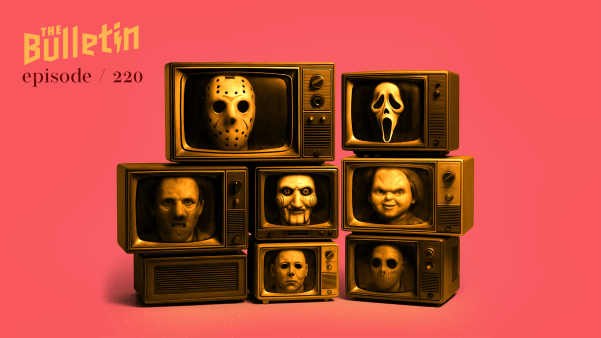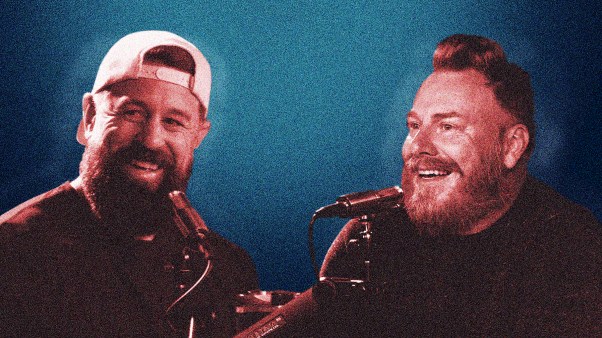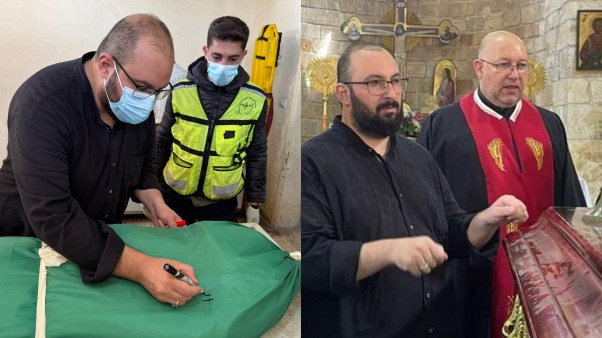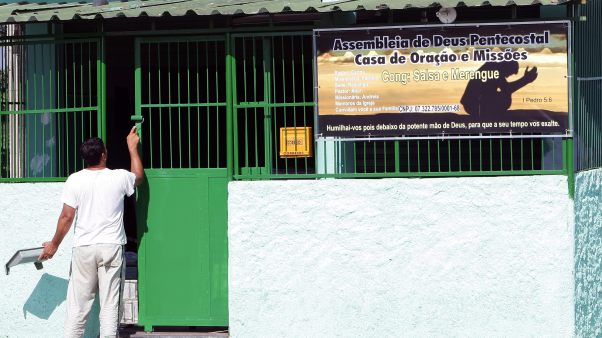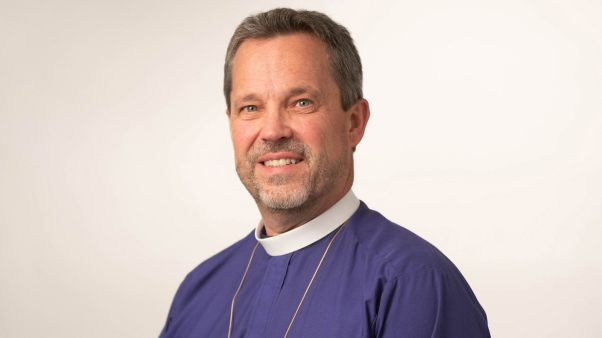Society holds up the athlete, the jock, the handsome hunk as the ideal man. Believing that lie, I didn’t stand a chance while growing up. I was average in appearance, awkward as an athlete, and short. Physical education classes in junior high and high school were nightmares. I was always chosen last. When we lost games, I was often the scapegoat. The gym teacher at my Christian school once joked about my lack of coordination in front of the class. My peers laughed. My heart sank. My already poor self-image was battered with the abuse. I wanted to crawl into a hole and die.
It was during those years that I started struggling with homosexual desires, beginning when I saw two male classmates in my Christian junior high school engaging in sex. Even though I had been attracted to girls when I was younger, my feelings for males intensified. In high school, the guys ridiculed gays. On the outside I laughed, but on the inside I was dying.
No matter how much I battled, suppressed, and prayed against these feelings, they not only didn’t go away, they strengthened. At times I would cry out to God, begging him to change me. But no change came. God was silent.
Thoughts of men occupied my mind every day. Sometimes I fought them. Usually I gave in. Not only did the fantasies bring pleasure, but they were also a convenient escape from the pain of life.
When I saw an attractive guy on the street, I took a second look. I regularly scanned men’s clothing ads in the Sunday paper. When I went off to college, I began to peruse porn at newsstands and then visited adult bookstores, looking for a picture of the perfect man.
While I had never acted out my fantasies with another man, I knew my desires were something I couldn’t share with others. My Christian parents used words such as “disgusting” and “perverted” when talking about homosexuals. I would rather have died than be found out. The shame and despair were often overwhelming, and I wondered why life had dealt me such a cruel hand. I felt defeated and hopeless.
One day, 15 years ago, I read the following: “Change may be possible for a small number of homosexuals, but for the majority, change is not possible.”
This confirmed the conclusion I had already reached about myself. I was part of the majority. Change was not possible. It didn’t help that groups such as the American Psychiatric Association no longer classified homosexuality as a mental disorder and frowned upon “reparative therapies” as harmful.
Today, however, I no longer count myself in the “majority” who can’t change. So what happened? Three critical issues come to mind.
1. There’s no quick fix.
Years of daily fantasizing, hundreds of pornographic images etched in my mind, deeply rooted patterns of same-sex thoughts, patterns of dealing with pain through escape into the world of lustful fantasies—they all began when I observed some of my junior high peers engaging in homosexual activity. Naïve as I was, this fleeting exposure played a major role in my same-sex fantasy world.
I logged years of homosexual fantasies into my memory banks. I plastered the walls of my mind with sexual images of men. I learned patterns of dealing with life and pain in sexual ways. For years, the central part of me made choices to lust, to fantasize, to look at pornography. These served to solidify my homosexual identity.
C. S. Lewis notes in Mere Christianity, “[E]very time you make a choice you are turning the central part of you, the part of you that chooses, into something a little different from what it was before. And taking your life as a whole with all your innumerable choices, all your life long you are slowly turning this central thing either into a heavenly creature or a hellish creature.”
So was it reasonable to expect a sudden cure from homosexuality? Would God sanctify me the way I turn on a light switch? He could have—but that is not what he is doing. While I know that my heart has been washed clean by the blood of Jesus, I am on a journey of healing. Sanctification is a process. I am being transformed by the renewing of my mind. New mental channels are being etched. I am learning new ways of dealing with pain. Each day, I face the challenge of making choices that, with God’s help, will slowly turn this central part of me into the man that God intended me to be all along.
For me, every day is a choice of obedience. I constantly need to choose the good. God tells me to bring every thought into captivity, to make no provision for the flesh, to not go near the door of sin’s house. Jesus tells me that if my right eye offends me, I must pluck it out. For years, I had a half-hearted commitment to that kind of obedience. I was like the man in the cartoon leaving an adult bookstore. The caption reads, “I can’t understand why I have so much trouble with thoughts of lust.”
I finally realized that I needed to stop feeding the fire of lust. For me, that means saying no to things that tempt me: Don’t channel surf. Don’t watch television when no one else is present. Don’t check out the male models in the Sunday paper. Don’t go near the newsstand. Don’t enter video stores or bookstores without my wife. Don’t have access to the internet.
I would like a quick fix. I want a magic formula. But instead, God tells me, “Obey!” Every day, I must employ his power to put to death whatever belongs to my lower nature. No, these decisions haven’t turned me around overnight, but when I stopped making provision for my lust and began to practice obedience, I was surprised that my sexual fantasies ebbed considerably. I shouldn’t have been. Interestingly enough, I also began to find my wife more attractive, and my sexual drive began to be channeled toward her.
Amid this process, I’ve discovered how I had been using sexual fantasy to deal with pain. It was time for me to grow up. Part of this has involved learning to deal with stress, anger, and frustration in responsible ways.
2. Homosexual lust is not the crucial issue.
In my sophomore year, I mustered up enough courage to make an appointment at the counseling center of my Christian college. The counselor was pretty clueless. First he sent me to assertiveness training. Then one day he asked what I thought of my private parts. I don’t think he was trying to be weird, but I felt very uncomfortable and violated. I didn’t return.
As time passed, my struggle with pornography intensified. Although I knew it was destructive, I couldn’t seem to stop. The dissonance between claiming to be a Christian and absorbing sinful images in adult bookstores was more than I could take.
I was convicted enough to see another Christian counselor. He listened as I confessed. I saw him fumbling for a solution. He suggested I go back to the bookstore with a bag full of quarters and use as many as I needed in the viewing booth to “get it out of my system.” I knew this Christian counselor had no more answers than I did.
A few years later, a new counselor suggested that I start dating. He gave me a false dream that somehow life would fix itself if I simply started acting like a heterosexual. I soon learned that acting as if life was normal didn’t make it so. The struggle didn’t go away. I got married, and my life became more complicated and stressful.
About 10 years ago, God led me to a ministry that specializes in helping those who struggle with same-sex attraction. The counseling I received—full of both grace and truth—gave me hope. The counselor said he believed God had the power to change me. How much change depended on what God had in store for me and how hard I was willing to work. In this setting, I began to honestly face the lies I had believed for so long and to embrace the truth. I learned several important things.
I learned it is okay to be a man. I struggled with this simple but profound truth for years. Looking back on my childhood, I sensed that my mother would have been happier if I had been a girl. My dad was distant. They didn’t get along well, and she formed an unhealthy relationship with me. For years she berated my father, the one who was supposed to be my masculine role model, in front of me.
I learned that masculinity comes in all shapes, sizes, levels of athletic ability, and interests. When God brought a mentor into my life to move me toward a healthy perspective on maleness, I was surprised that he was actually an inch shorter than me. Yet he was a real man, too.
I learned that God wants me to want him more than healing. Healing is not a list of magic formulas and an accountability partner (although definite decisions and accountability are very important). It is a process of learning to connect with God and allowing him to heal me and to meet my deepest needs. My counselor reminded me often that I would not find what I needed in the arms of another man. I needed to learn to allow God to hold me, to love me, to care for me, to affirm me, and to nurture me. That was difficult, because I believed God to be distant, uncaring, and disappointed with who I was.
My counselor encouraged me again and again to read God’s Word and to listen to God’s voice. The apostle Paul tells me in Romans 12 that I need to be transformed by the renewing of my mind. Ephesians 4:22–24 tells me, “You were taught, with regard to your former way of life, to put off your old self, which is being corrupted by its deceitful desires; to be made new in the attitude of your minds; and to put on the new self, created to be like God in true righteousness and holiness.”
I need to let my mind be washed and renewed by his Word that is able to teach, rebuke, correct, and train me in righteousness (2 Tim. 3:16). I am learning that I need to let God’s Word soak into the core of my being and do its cleansing work.
Frankly, this has been a demanding process. But I am finally learning at a core level that God loves me and is able to meet my deepest needs. I hear him affirming me. I hear him telling me that I am his child, that he loves me and wants what is best for me. I am now convinced of something I never would have believed 15 years ago: God is able to give me new and right desires (Ezek. 36:26).
3. You can’t do it without the church.
In the early years of my struggle, many churches wished people like me would go away. The pendulum for many churches has now swung in the other direction—too far. Many liberal churches now bless homosexuality. Both stances tell me that churches don’t really want to deal with people like me. Both approaches ignore those of us who struggle and who believe that God created us for something better and who want desperately to be heard, helped, and healed.
I have found very few conservative churches where it is safe to struggle in this area. Even though one of my pastors assured me that my secret was safe with him, within a few weeks he had talked about it with three other people.
Over the years, I have taken huge risks to share my experiences with some Christian friends whom I thought I could trust. Needless to say, several of those friends wounded me deeply when they conveniently found ways to exit from my life.
What if the church were full of people who were loving and safe, willing to walk alongside people who struggle? What if there were people in the church who kept confidences, who took the time to be Jesus to those who struggle with homosexuality? What if the church were what God intended it to be? What if broken people could safely do what James said: “Confess your sins to one another and pray for each other that you may be healed”?
When I told another pastor my story, he loved me, prayed for me, encouraged me, and helped me in my journey toward wholeness. I began meeting with one of the counselors at a ministry under the umbrella of Exodus International, a parachurch organization that works with those wanting to leave homosexuality. I was introduced to Jeff, a volunteer mentor. Jeff was in sales. He was a husband, a dad, and a Little League coach.
I wondered if Jeff would be just like everyone else, but he was all I had. To my relief, I found him to be patient and kind. The fruits of the Spirit were evident in him. I could share my struggles. Jeff listened. He loved me. He was firm in the truth of God’s Word, yet compassionate. He knew how to walk the line between grace and truth. And at the end of every visit, he prayed for me, asking that I would understand God’s love and that God would help me in my struggle. He was not a counselor. He was not a therapist. He was a guy who loved Jesus.
After meeting with him for a few months, it dawned on me: I wonder if God is like this. I wonder if he loves me and accepts me like Jeff does.
Then God brought Bill into my life. My struggle didn’t matter to him, either. He told me we all have our “stuff” and that my struggle with homosexual attraction wasn’t any worse than the stuff he struggled with. Over the course of the last few years, God has brought a few other guys into my life who have been willing to walk with me and hold me accountable. I firmly believe that good Christian counseling, the support and encouragement of people in the church, and the realization that this is a process have played major roles in my healing. Skeptics say change is impossible, but the skeptics haven’t talked with me.
Learning to Run Again
I wish I could say that the road to healing is quick and easy. Perhaps that is true for some, but it hasn’t been for me. Though my struggle has lessened considerably, for me this is a lifelong battle. Sometimes it is three steps forward and one or two steps back. But why should I expect anything different? I didn’t get this way overnight.
When my son was little, he sometimes toppled over while attempting to walk. But I cheered him on. I didn’t scold him when he fell. I picture God and a whole lot of heroes of faith cheering me on, encouraging me to get back up and keep trying.
Some people might say that I am suppressing who I really am. I look at it as obeying the words of the apostle Paul, who said, “Put to death therefore whatever belongs to your lower nature” (Col. 3:5).
You may wonder if the change I am experiencing is just a change in behavior and not in orientation. I think it’s both. In my early years, I concluded I was gay because of my thoughts and desires. I no longer believe that I am gay. I am a new person in Christ. I am a heterosexual man who struggles at times with homosexual thoughts.
I can’t speak for everyone. There is no single journey of healing for the person who struggles with homosexuality. At one point in my life, the temptation to lust was an hourly harassment. Today, it is more like a pesky bird that occasionally flies overhead and wants to build a nest in my hair. I even find myself struggling with heterosexual lust at times. While that may seem like progress, God has convicted me that exchanging one form of lust for another is still sin.
I continue on the road to healing and healthy masculinity. My masculine identity is becoming more solid. I am deeply in love with my wife. I am feeling better about myself as a male and as a person. I am thankful to God for how far he has brought me.
In my battle, these words of C. S. Lewis have been encouraging:
But if you are a poor creature—poisoned by a wretched upbringing in some house full of vulgar jealousies and senseless quarrels—saddled, by no choice of your own, with some loathsome sexual perversion—nagged day in and day out by an inferiority complex that makes you snap at your best friends—do not despair. He knows all about it. You are one of the poor whom he blessed. He knows what a wretched machine you are trying to drive. Keep on. Do what you can. One day (perhaps in another world, but perhaps far sooner than that) he will fling it on the scrapheap and give you a new one. And then you may astonish us all—not least yourself: for you have learned your driving in a hard school. (Some of the last will be first and some of the first will be last.)
I am experiencing a change far beyond what I dreamed was possible. With God’s help and encouragement from his people, I refuse to settle for a spot with the majority.
The author lives in the Midwest.
Copyright © 2007 Christianity Today. Click for reprint information.
Related Elsewhere:
Christianity Today‘s special section on sexuality and gender includes:
Re-engineering Temptation | Fuzzy science sparks debate over treatments to reverse homosexuality. (April 9, 2007)
The Rebirth of Venus | Charlene Cothran, editor of a magazine for African-American gays and lesbians, on how she renounced homosexuality and came to Christ. (March 23, 2007)
My Dirty Little Former Secret | God used a movie about gay cowboys to release me from the burden of my past. (April 1, 2006)
Therapeutically Incorrect | Atheist psychiatrist argues that gays can change. (April 2005)
My Path to Lesbianism | It was hatred of women that drove me there, and Christ in community that led me out. February 2005)
Cheated by the Affirming Church | Contrary to what some churches teach, it is homosexuality—and not its suppression—that enslaves people like me. (December 1, 2004)
No Easy Victory | A plea from a Christian husband and father who, day by day, resists his homosexual desires. (March 11, 2002)
Ex-Gay Leader Disciplined for Gay Bar Visit | Exodus removes John Paulk as board chairman, places him on probationary status as member. (October 1, 2000)



